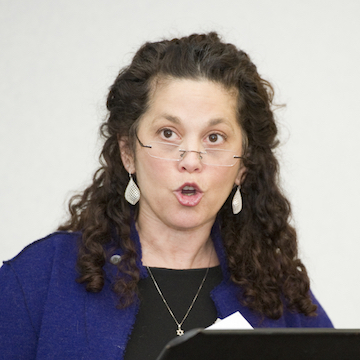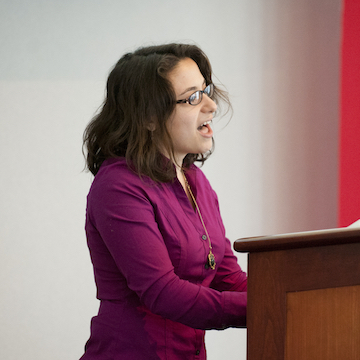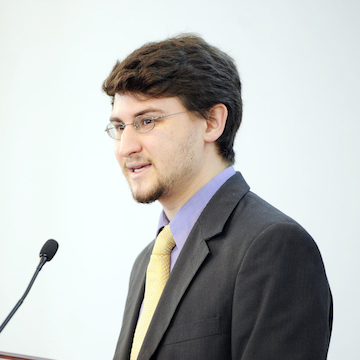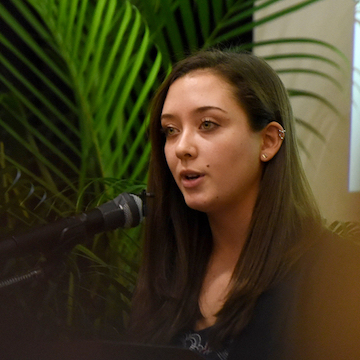The Arts
In the ghettos, camps, and hideaways of World War II, music served both an artistic and a utilitarian function. Newly fashioned topical songs acted as messengers and memory aids to pass along prison gossip or rumors of deportations, while “escapist” music, mostly songs popular before the war, offered a spell of relief from continuing daily trials. Other forms of artistic expression, too, played important practical and psychological roles in the camps and ghettos.
For many victims of the Holocaust, art became a means of survival; “music was life.” Art was also a means of rebellion, by which the artists created something that would last beyond the war, even if they themselves died. By producing art, the artists ensured that the Nazis would not achieve their goal of completely exterminating the Jewish people. These subtle acts of rebellion resonate still today with the defiance, the hope, and the strength of the creators.
After liberation, an ongoing need remained for commemorative art and music, as survivors began to convene formally to mourn victims. Art, as a tool to invoke a feeling, has long been used to express the sorrow, the pain, and the hope for a better future that accompanies discussion of the Holocaust and other genocides. [1]
From the beginning, the arts have played a central role in Holocaust remembrance at Northeastern. The Zamir Chorale, the Klezmer Music Makers, and the Machol Klezmer Band, among others, have performed for Holocaust Awareness Week, which has also included ballets, operas, and art installations.
The establishment of the Gideon Klein Award in 1997 added depth to the artistic aspects of Northeastern’s Holocaust commemoration. Gideon Klein Scholars either create an original work of art, prepared a performance, or do research on an aspect of the arts and the Holocaust; they offer a public presentation at the annual Holocaust commemoration sponsored by the President’s office. Gideon Klein Scholars have explored such diverse topics as Nazi censorship of the arts, children’s music in Terezin, and photography ethics in Auschwitz; performances have included “Frauenstimmen: Women’s Voices from Ravensbrück,” “The Westerbork Caberet,” and “The Closed Town: Poetry from Terezin,” among many others.
2023-05-17T19:44:06Z
A
CoreFile
neu:cj82mt69k
northeastern:drs:college_of_social_sciences_humanities:holocaust_awareness_committee
northeastern:drs:library:archives
northeastern:drs:repository:staff
public
000065221
neu:cj82mt557
neu:cj82mt557
000065221
000065221
/downloads/neu:cj82mt80k?datastream_id=thumbnail_1
/downloads/neu:cj82mt80k?datastream_id=thumbnail_2
/downloads/neu:cj82mt80k?datastream_id=thumbnail_3
/downloads/neu:cj82mt80k?datastream_id=thumbnail_4
/downloads/neu:cj82mt80k?datastream_id=thumbnail_5
/downloads/neu:cj82mt80k?datastream_id=thumbnail_1
/downloads/neu:cj82mt80k?datastream_id=thumbnail_2
/downloads/neu:cj82mt80k?datastream_id=thumbnail_3
/downloads/neu:cj82mt80k?datastream_id=thumbnail_4
/downloads/neu:cj82mt80k?datastream_id=thumbnail_5
PdfFile
PdfFile
neu:cj82mt557
000065221
/downloads/neu:cj82mt80k?datastream_id=thumbnail_1
/downloads/neu:cj82mt80k?datastream_id=thumbnail_2
/downloads/neu:cj82mt80k?datastream_id=thumbnail_3
/downloads/neu:cj82mt80k?datastream_id=thumbnail_4
/downloads/neu:cj82mt80k?datastream_id=thumbnail_5
PdfFile
Music in Terezin 1941-1945, 1994.
Music in Terezin 1941-1945, 1994.
Music in Terezin 1941-1945, 1994.
Music in Terezin 1941-1945, 1994.
Postcard for a musical event over two days, presented my Northeastern Hillel.
Northeastern University (Boston, Mass.).
Hillel
Northeastern University (Boston, Mass.).
Jewish Studies Program
Northeastern University (Boston, Mass.).
Hillel
Sponsor
Sponsor
Sponsor
Northeastern University (Boston, Mass.).
Jewish Studies Program
Sponsor
postcards
1994-11-19
1994-11-19
Transferred by the Center for Spirituality, Dialogue and Service.
Days of Remembrance of the Victims of the Holocaust
Holocaust, Jewish (1939-1945)
Holocaust, Jewish (1939-1945), in music
Jews
Europe
History
20th century
World War, 1939-1945
Concentration camps
Europe
World War, 1939-1945
Jewish resistance
Days of Remembrance of the Victims of the Holocaust
Holocaust, Jewish (1939-1945)
Holocaust, Jewish (1939-1945), in music
Jews
Europe
History
20th century
World War, 1939-1945
Concentration camps
Europe
World War, 1939-1945
Jewish resistance
Ullman Viktor
Kien Petr
Northeastern University (Boston, Mass.). Hillel
Hebrew College (Brookline, Mass.)
Lifebridge Foundation, Inc.
Alfred Nash Patterson Foundation
Choral Arts New England, Inc
Northeastern University (Boston, Mass.). Jewish Studies Program
Northeastern University (Boston, Mass.). nuArts Contemporary Performance Series
Ullman Viktor
Kien Petr
Northeastern University (Boston, Mass.). Hillel
Northeastern University (Boston, Mass.).
Hillel
Hebrew College (Brookline, Mass.)
Lifebridge Foundation, Inc.
Alfred Nash Patterson Foundation
Choral Arts New England, Inc
Northeastern University (Boston, Mass.).
Jewish Studies Program
Northeastern University (Boston, Mass.).
nuArts Contemporary Performance Series
Northeastern University (Boston, Mass.).
Hillel
Hebrew College (Brookline, Mass.)
Hebrew College (Brookline, Mass.)
Lifebridge Foundation, Inc.
Lifebridge Foundation, Inc.
Alfred Nash Patterson Foundation
Alfred Nash Patterson Foundation
Choral Arts New England, Inc
Choral Arts New England, Inc
Northeastern University (Boston, Mass.). Jewish Studies Program
Northeastern University (Boston, Mass.).
Jewish Studies Program
Northeastern University (Boston, Mass.). nuArts Contemporary Performance Series
Northeastern University (Boston, Mass.).
nuArts Contemporary Performance Series
http://hdl.handle.net/2047/D20208552
A64.B09.F031.004
http://hdl.handle.net/2047/D20208552
Days of Remembrance of the Victims of the Holocaust
Holocaust, Jewish (1939-1945)
Holocaust, Jewish (1939-1945), in music
Jews
Europe
History
20th century
World War, 1939-1945
Concentration camps
Europe
World War, 1939-1945
Jewish resistance
Music in Terezin 1941-1945, 1994.
Holocaust and Genocide Awareness Committee records (A67)
Music in Terezin 1941-1945, 1994.
Music in Terezin 1941-1945, 1994.
music in terezin 19411945 001994
1994/11/19
Music in Terezin 1941-1945, 1994.
1994-11-19
Days of Remembrance of the Victims of the Holocaust
Holocaust, Jewish (1939-1945)
Holocaust, Jewish (1939-1945), in music
Jews Europe History 20th century
World War, 1939-1945 Concentration camps Europe
World War, 1939-1945 Jewish resistance
Ullman Viktor
Kien Petr
Northeastern University (Boston, Mass.). Hillel
Hebrew College (Brookline, Mass.)
Lifebridge Foundation, Inc.
Alfred Nash Patterson Foundation
Choral Arts New England, Inc
Northeastern University (Boston, Mass.). Jewish Studies Program
Northeastern University (Boston, Mass.). nuArts Contemporary Performance Series
Northeastern University (Boston, Mass.).
Hillel
Northeastern University (Boston, Mass.).
Jewish Studies Program
Northeastern University (Boston, Mass.).
info:fedora/afmodel:CoreFile
info:fedora/neu:cj82mt557
2023-05-17T19:44:06.564Z
2023-05-17T21:25:54Z
A
CoreFile
neu:cj82mz242
northeastern:drs:library:archives
northeastern:drs:college_of_social_sciences_humanities:holocaust_awareness_committee
northeastern:drs:repository:staff
public
000065221
neu:cj82mt557
neu:cj82mt557
000065221
000065221
/downloads/neu:m0407528z?datastream_id=thumbnail_1
/downloads/neu:m0407528z?datastream_id=thumbnail_2
/downloads/neu:m0407528z?datastream_id=thumbnail_3
/downloads/neu:m0407528z?datastream_id=thumbnail_4
/downloads/neu:m0407528z?datastream_id=thumbnail_5
/downloads/neu:m0407528z?datastream_id=thumbnail_1
/downloads/neu:m0407528z?datastream_id=thumbnail_2
/downloads/neu:m0407528z?datastream_id=thumbnail_3
/downloads/neu:m0407528z?datastream_id=thumbnail_4
/downloads/neu:m0407528z?datastream_id=thumbnail_5
PdfFile
PdfFile
neu:cj82mt557
000065221
/downloads/neu:m0407528z?datastream_id=thumbnail_1
/downloads/neu:m0407528z?datastream_id=thumbnail_2
/downloads/neu:m0407528z?datastream_id=thumbnail_3
/downloads/neu:m0407528z?datastream_id=thumbnail_4
/downloads/neu:m0407528z?datastream_id=thumbnail_5
PdfFile
Music at Noon.
Music at Noon.
Music at Noon.
Music at Noon.
Program for the 1994 "Music at Noon" musical program, conducted by Joshua Jacobson.
Northeastern University (Boston, Mass.).
Department of Music.
Northeastern University (Boston, Mass.).
Department of Music.
Presenter
Presenter
programs (documents)
1994-05-26
1994-05-26
Transferred by the Holocaust Awareness Committee.
Holocaust, Jewish (1939-1945), in music
Holocaust, Jewish (1939-1945), in music
Rohs Todd
Macri Melissa
Matthews Gina Fatutta
Tall Christine
Frattaroli Joanne
Segal Jeanne
Frink Mary
O'Donnell Kim
Lampert Joanna
Thomas Annie
Buenpacifico Teresa
Dowd Rebecca
Leone Carey
Levin Andrea
Walker Nicole
Craw Katy
Vagnini Chris
Fumia Adam
Bozeman Virgil
McQueen Chad
Colena Michael
d'Amato Al
Pymann Aaron
Lichter Jeremy
Hall Alex
Griffin Dan
Whitney Jon
Swanborn Edwin
Jacobson Joshua
Desmond Ed
Miller Jason
Herman Gerald
Northeastern University (Boston, Mass.). Holocaust Awareness Committee
Northeastern University (Boston, Mass.). Jewish Studies Program
Northeastern University (Boston, Mass.). Department of Music
Northeastern University (Boston, Mass.). Bernard Stotsky Professorship in Jewish Historical and Cultural Studies
Northeastern University (Boston, Mass.). Choral Society
Northeastern University (Boston, Mass.). University Ombudsperson.
Rohs Todd
Macri Melissa
Matthews Gina Fatutta
Tall Christine
Frattaroli Joanne
Segal Jeanne
Frink Mary
O'Donnell Kim
Lampert Joanna
Thomas Annie
Buenpacifico Teresa
Dowd Rebecca
Leone Carey
Levin Andrea
Walker Nicole
Craw Katy
Vagnini Chris
Fumia Adam
Bozeman Virgil
McQueen Chad
Colena Michael
d'Amato Al
Pymann Aaron
Lichter Jeremy
Hall Alex
Griffin Dan
Whitney Jon
Swanborn Edwin
Jacobson Joshua
Desmond Ed
Miller Jason
Herman Gerald
Northeastern University (Boston, Mass.). Holocaust Awareness Committee
Northeastern University (Boston, Mass.).
Holocaust Awareness Committee
Northeastern University (Boston, Mass.).
Jewish Studies Program
Northeastern University (Boston, Mass.).
Department of Music
Northeastern University (Boston, Mass.).
Bernard Stotsky Professorship in Jewish Historical and Cultural Studies
Northeastern University (Boston, Mass.).
Choral Society
Northeastern University (Boston, Mass.).
University Ombudsperson.
Northeastern University (Boston, Mass.).
Holocaust Awareness Committee
Northeastern University (Boston, Mass.). Jewish Studies Program
Northeastern University (Boston, Mass.).
Jewish Studies Program
Northeastern University (Boston, Mass.). Department of Music
Northeastern University (Boston, Mass.).
Department of Music
Northeastern University (Boston, Mass.). Bernard Stotsky Professorship in Jewish Historical and Cultural Studies
Northeastern University (Boston, Mass.).
Bernard Stotsky Professorship in Jewish Historical and Cultural Studies
Northeastern University (Boston, Mass.). Choral Society
Northeastern University (Boston, Mass.).
Choral Society
Northeastern University (Boston, Mass.). University Ombudsperson.
Northeastern University (Boston, Mass.).
University Ombudsperson.
http://hdl.handle.net/2047/D20209162
A67.B02.F010.001
http://hdl.handle.net/2047/D20209162
Holocaust, Jewish (1939-1945), in music
Music at Noon.
Holocaust and Genocide Awareness Committee records (A67)
Music at Noon
Music at Noon.
music at noon
1994/05/26
Music at Noon.
1994-05-26
Holocaust, Jewish (1939-1945), in music
Rohs Todd
Macri Melissa
Matthews Gina Fatutta
Tall Christine
Frattaroli Joanne
Segal Jeanne
Frink Mary
O'Donnell Kim
Lampert Joanna
Thomas Annie
Buenpacifico Teresa
Dowd Rebecca
Leone Carey
Levin Andrea
Walker Nicole
Craw Katy
Vagnini Chris
Fumia Adam
Bozeman Virgil
McQueen Chad
Colena Michael
d'Amato Al
Pymann Aaron
Lichter Jeremy
Hall Alex
Griffin Dan
Whitney Jon
Swanborn Edwin
Jacobson Joshua
Desmond Ed
Miller Jason
Herman Gerald
Northeastern University (Boston, Mass.). Holocaust Awareness Committee
Northeastern University (Boston, Mass.). Jewish Studies Program
Northeastern University (Boston, Mass.). Department of Music
Northeastern University (Boston, Mass.). Bernard Stotsky Professorship in Jewish Historical and Cultural Studies
Northeastern University (Boston, Mass.). Choral Society
Northeastern University (Boston, Mass.). University Ombudsperson.
Northeastern University (Boston, Mass.).
Department of Music.
Northeastern University (Boston, Mass.).
info:fedora/afmodel:CoreFile
info:fedora/neu:cj82mt557
2023-05-17T21:25:55.313Z
2023-05-17T21:15:13Z
A
CoreFile
neu:cj82mz25b
northeastern:drs:library:archives
northeastern:drs:college_of_social_sciences_humanities:holocaust_awareness_committee
northeastern:drs:repository:staff
public
000065221
neu:cj82mt28b
neu:cj82mt28b
000065221
000065221
/downloads/neu:m04075318?datastream_id=thumbnail_1
/downloads/neu:m04075318?datastream_id=thumbnail_2
/downloads/neu:m04075318?datastream_id=thumbnail_3
/downloads/neu:m04075318?datastream_id=thumbnail_4
/downloads/neu:m04075318?datastream_id=thumbnail_5
/downloads/neu:m04075318?datastream_id=thumbnail_1
/downloads/neu:m04075318?datastream_id=thumbnail_2
/downloads/neu:m04075318?datastream_id=thumbnail_3
/downloads/neu:m04075318?datastream_id=thumbnail_4
/downloads/neu:m04075318?datastream_id=thumbnail_5
PdfFile
PdfFile
neu:cj82mt28b
000065221
/downloads/neu:m04075318?datastream_id=thumbnail_1
/downloads/neu:m04075318?datastream_id=thumbnail_2
/downloads/neu:m04075318?datastream_id=thumbnail_3
/downloads/neu:m04075318?datastream_id=thumbnail_4
/downloads/neu:m04075318?datastream_id=thumbnail_5
PdfFile
Franz Schubert and the Vienna Synagogue flyer.
Franz Schubert and the Vienna Synagogue flyer.
Franz Schubert and the Vienna Synagogue flyer.
Franz Schubert and the Vienna Synagogue flyer.
Flyer for the 1997 concert program "Franz Schubert and the Vienna Synagogue," conducted by Joshua Jacobson.
Northeastern University (Boston, Mass.).
Chorale Society
Northeastern University (Boston, Mass.).
Chorale Society
Presenter
Presenter
fliers (printed matter)
1997-03-01
1997-03-01
Transferred by the Holocaust Awareness Committee.
Holocaust, Jewish (1939-1945)
Holocaust, Jewish (1939-1945), in music
Lectures and lecturing
Holocaust, Jewish (1939-1945)
Holocaust, Jewish (1939-1945), in music
Lectures and lecturing
Jacobson Joshua
Eskin Virginia
Northeastern University (Boston, Mass.). Holocaust Awareness Committee
Northeastern University (Boston, Mass.). Jewish Studies Program
Jacobson Joshua
Eskin Virginia
Northeastern University (Boston, Mass.). Holocaust Awareness Committee
Northeastern University (Boston, Mass.).
Holocaust Awareness Committee
Northeastern University (Boston, Mass.).
Jewish Studies Program
Northeastern University (Boston, Mass.).
Holocaust Awareness Committee
Northeastern University (Boston, Mass.). Jewish Studies Program
Northeastern University (Boston, Mass.).
Jewish Studies Program
http://hdl.handle.net/2047/D20209169
A67.B02.F010.002
http://hdl.handle.net/2047/D20209169
Holocaust, Jewish (1939-1945)
Holocaust, Jewish (1939-1945), in music
Lectures and lecturing
Franz Schubert and the Vienna Synagogue flyer.
Holocaust and Genocide Awareness Committee records (A67)
Franz Schubert and the Vienna Synagogue flyer
Franz Schubert and the Vienna Synagogue flyer.
franz schubert and the vienna synagogue flyer
1997/03/01
Franz Schubert and the Vienna Synagogue flyer.
1997-03-01
Holocaust, Jewish (1939-1945)
Holocaust, Jewish (1939-1945), in music
Lectures and lecturing
Jacobson Joshua
Eskin Virginia
Northeastern University (Boston, Mass.). Holocaust Awareness Committee
Northeastern University (Boston, Mass.). Jewish Studies Program
Northeastern University (Boston, Mass.).
Chorale Society
Northeastern University (Boston, Mass.).
info:fedora/afmodel:CoreFile
info:fedora/neu:cj82mt28b
2023-05-17T21:15:49.145Z
2023-05-17T19:44:55Z
A
CoreFile
neu:cj82mt88s
northeastern:drs:college_of_social_sciences_humanities:holocaust_awareness_committee
northeastern:drs:library:archives
northeastern:drs:repository:staff
public
000065221
neu:cj82mt87h
neu:cj82mt87h
000065221
000065221
/downloads/neu:m0406925s?datastream_id=thumbnail_1
/downloads/neu:m0406925s?datastream_id=thumbnail_2
/downloads/neu:m0406925s?datastream_id=thumbnail_3
/downloads/neu:m0406925s?datastream_id=thumbnail_4
/downloads/neu:m0406925s?datastream_id=thumbnail_5
/downloads/neu:m0406925s?datastream_id=thumbnail_1
/downloads/neu:m0406925s?datastream_id=thumbnail_2
/downloads/neu:m0406925s?datastream_id=thumbnail_3
/downloads/neu:m0406925s?datastream_id=thumbnail_4
/downloads/neu:m0406925s?datastream_id=thumbnail_5
PdfFile
PdfFile
neu:cj82mt87h
000065221
/downloads/neu:m0406925s?datastream_id=thumbnail_1
/downloads/neu:m0406925s?datastream_id=thumbnail_2
/downloads/neu:m0406925s?datastream_id=thumbnail_3
/downloads/neu:m0406925s?datastream_id=thumbnail_4
/downloads/neu:m0406925s?datastream_id=thumbnail_5
PdfFile
Brundibar program, 2006.
Brundibar program, 2006.
Brundibar program, 2006.
Brundibar program, 2006.
Program for the opera, Brundibar, performed by The Young Opera Company of New England.
Northeastern University (Boston, Mass.).
Holocaust Awareness Committee
Northeastern University (Boston, Mass.).
Department Of Music
Northeastern University (Boston, Mass.).
Jewish Studies Program
Northeastern University (Boston, Mass.).
Holocaust Awareness Committee
Sponsor
Sponsor
Sponsor
Sponsor
Northeastern University (Boston, Mass.).
Department Of Music
Sponsor
Northeastern University (Boston, Mass.).
Jewish Studies Program
Sponsor
programs (documents)
2006-03-26
2006-03-26
Transferred by the Center for Spirituality, Dialogue and Service.
Children of Holocaust survivors
Holocaust, Jewish (1939-1945)
Holocaust, Jewish (1939-1945), in music
Jews
Europe
History
20th century
World War, 1939-1945
Personal narratives
Children of Holocaust survivors
Holocaust, Jewish (1939-1945)
Holocaust, Jewish (1939-1945), in music
Jews
Europe
History
20th century
World War, 1939-1945
Personal narratives
Stilianos Lucas
Mahoney Emily
Favaloro Andrew
Gonchar Vicky
Maeks-Anderson Rosita
Headley Alexandria
Gigliello Justin
McKechnie Riley
Bellino Rose-Antoinette
Pavlik Jessica
Becker Cassandra
Carter Andrew
Carter Kathryn
Carter William
Krasa Hans
Hoffmeister Adolf
Karas Josa
Northeastern University (Boston, Mass.). Holocaust Awareness Committee
Stilianos Lucas
Mahoney Emily
Favaloro Andrew
Gonchar Vicky
Maeks-Anderson Rosita
Headley Alexandria
Gigliello Justin
McKechnie Riley
Bellino Rose-Antoinette
Pavlik Jessica
Becker Cassandra
Carter Andrew
Carter Kathryn
Carter William
Krasa Hans
Hoffmeister Adolf
Karas Josa
Northeastern University (Boston, Mass.). Holocaust Awareness Committee
Northeastern University (Boston, Mass.).
Holocaust Awareness Committee
Northeastern University (Boston, Mass.).
Holocaust Awareness Committee
http://hdl.handle.net/2047/D20208557
A64.B10.F003.001
http://hdl.handle.net/2047/D20208557
Children of Holocaust survivors
Holocaust, Jewish (1939-1945)
Holocaust, Jewish (1939-1945), in music
Jews
Europe
History
20th century
World War, 1939-1945
Personal narratives
Brundibar program, 2006.
Holocaust and Genocide Awareness Committee records (A67)
Brundibar Program, 2006.
Brundibar program, 2006.
brundibar program 002006
2006/03/26
Brundibar program, 2006.
2006-03-26
Children of Holocaust survivors
Holocaust, Jewish (1939-1945)
Holocaust, Jewish (1939-1945), in music
Jews Europe History 20th century
World War, 1939-1945 Personal narratives
Stilianos Lucas
Mahoney Emily
Favaloro Andrew
Gonchar Vicky
Maeks-Anderson Rosita
Headley Alexandria
Gigliello Justin
McKechnie Riley
Bellino Rose-Antoinette
Pavlik Jessica
Becker Cassandra
Carter Andrew
Carter Kathryn
Carter William
Krasa Hans
Hoffmeister Adolf
Karas Josa
Northeastern University (Boston, Mass.). Holocaust Awareness Committee
Northeastern University (Boston, Mass.).
Holocaust Awareness Committee
Northeastern University (Boston, Mass.).
Department Of Music
Northeastern University (Boston, Mass.).
Jewish Studies Program
Northeastern University (Boston, Mass.).
info:fedora/afmodel:CoreFile
info:fedora/neu:cj82mt87h
2023-05-17T19:45:11.312Z
Gideon Klein Scholar Presentations
Please note that the performances of scholars are part of a larger presentation. Each image and link provides access to content where applicable.
[1] Hayes, Peter and John K Roth, eds. The Oxford Handbook of Holocaust Studies. (Oxford: Oxford University Press, 2012), 610.



